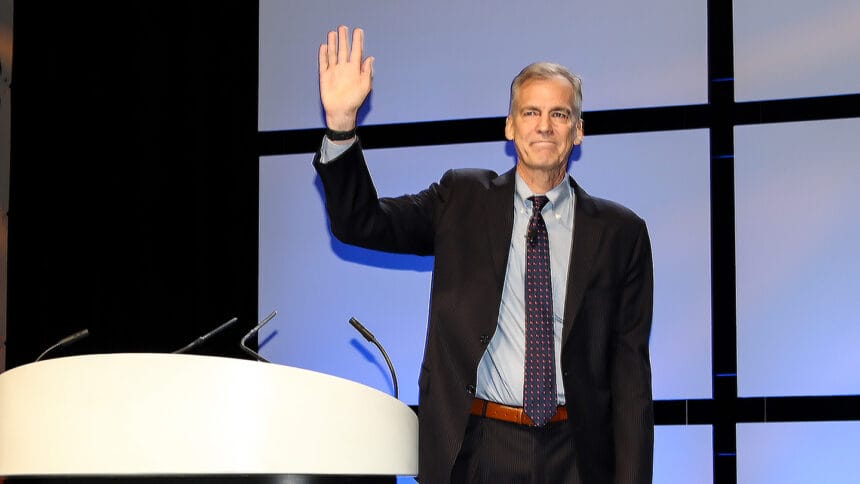
Mark Parkinson, the US nursing home industry’s most influential spokesman for at least a generation, announced today he will be stepping down from his post as president and CEO of the American Health Care Association/National Center for Assisted Living Jan. 15, 2025.
Considered a rare “unicorn” leader for his unique blend of business and political background — buttressed by street credibility as a former facility operator — Parkinson’s announcement had been expected in inner circles for months.
Parkinson successfully led the battered sector through some of its most harrowing days during the COVID-19 pandemic. But he had made it known to colleagues that he did not expect to renew his contract for another term, providing a soft landing for his successor.
He stepped into the AHCA/NCAL top post in January 2011, after declining to run for another term as the governor of Kansas.
“My overwhelming emotion is gratitude,” Parkinson said in a statement Tuesday. “I am incredibly thankful to have had the opportunity to represent our members in Washington for the last 13 years. These have been the most important and rewarding years of my professional life.”
He predicted “the most exciting times in the history of the profession are yet to come.”
Parkinson is a former owner of a chain of assisted living facilities in Kansas and Missouri that he operated along with his wife and fellow lawyer, Stacy. He is credited with rebuilding the AHCA/NCAL network of state affiliates and bringing back in house the Alliance for Quality Nursing Home Care, a powerful group of major nursing home operators back intent on more aggressive lobbying.
“He’s the best executive in AHCA’s history. No one comes close,” said Sabra Health Care REIT CEO Rick Matros, one of the Alliance’s former leaders. “He was the best possible ambassador and face of the industry during the most catastrophic period in its history, the pandemic. He generated a level of confidence by state affiliates in AHCA that hadn’t been the case historically. Beyond that, he is a really good person who led with integrity and transparency.”
Accolades amass
A sold-out crowd is expected March 21 in Chicago when Parkinson will be honored with the Career Achievement Award in the McKnight’s Pinnacle Awards program, which recognizes top veteran leaders in long-term care.
“It is bittersweet that we are announcing Mark Parkinson’s retirement,” said Phil Scalo, chairman of the American Health Care Association Board of Governors and one of the leaders charged with finding his replacement. “Mark has been an incredible leader for our association, our members, and the long-term care sector at large. Mark’s contributions to our association and sector are unmatched, and we cannot thank him enough for his unwavering dedication to improving the lives of our nation’s seniors. He will be deeply missed.”
A national search has already begun for Parkinson’s successor, with the announcement of a replacement possibly to come after a summer vote by AHCA/NCAL electors. A formal introduction at the group’s annual convention in October could then be made, just as Parkinson was introduced in-person nearly 14 years ago.
Clifton J. Porter II, AHCA/NCAL’s executive vice president of government relations for more than a decade, is the presumed leading candidate to replace his boss, but association insiders have stressed that a nationwide search will be conducted with due diligence before any vote would be taken.
The association highlighted several of Parkinson’s noted successes in a statement announcing his retirement. They include the development and launch of the Quality Initiative, a multi-year national endeavor to improve quality outcomes in long-term and post-acute care facilities and his leadership through the pandemic, leading the association to “record” membership levels. Parkinson became a regular presence on national broadcast outlets, and others, answering questions and informing the public of the unique dangers COVID-19 posed in nursing homes.
Emmett Reed, CEO of the Florida Health Care Association, reflected some of the sector’s allure to the lanky, congenial Parkinson during a speaker introduction at the eCap Summit conference last week in Miami.
“Mark is a unicorn — that’s what they call him,” Reed said, noting Parkinson’s “battlescars” from time spent as an owner/operator. “We had one of our own [Parkinson] come in here to the American Health Care Association, when they weren’t necessarily a strong organization. With his leadership, I was able to bring in members who had left the [state] association years ago. They started to see the value of the state and national association. At the end of the day, that strength is attributed to our members, but it takes leaders to unite the members.”
Preceding Parkinson as AHCA’s top exec was Bruce Yarwood, a long-time lobbyist with the group, who is credited with bringing stability after the brief, tumultuous tenure of politician Hal Daub. He had arrived after a five-year term by Chip Roadman, an obstetrician and military veteran who also did not have roots in the industry. Preceding him was a 16-year term by Paul Willging, whose leadership dated back to the early 1980s.




